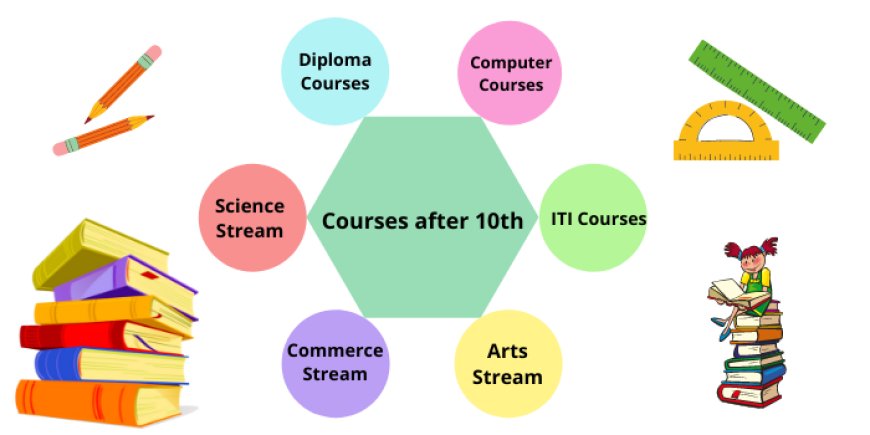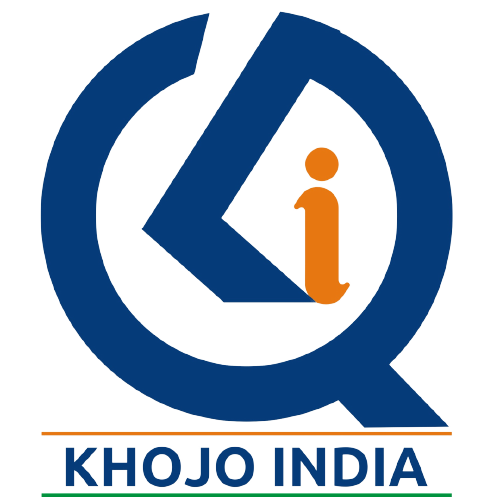Courses after 10th

Courses after 10th
Choosing the right course after 10th is very important because it sets the foundation for your future education and career. So making an informed decision at this stage can provide a strong foundation and set you on the right path towards achieving your goals. Here are some reasons why and what is important to make an informed decision about the course you pursue after 10th:
- Educational Pathway: The course you choose after 10th also determines your educational pathway. It is essential to consider if you have any long-term educational aspirations and choose a course that aligns with your future educational plans.
- Personal Growth: Opting for a course after 10th allows for personal growth and self-discovery. It provides an opportunity to explore your interests, strengths, and aptitudes.
-
Career Alignment: The course you choose after 10th can significantly impact your future career options. Different courses provide specialized knowledge and skills that align with specific industries and professions.
-
Skill Development: Courses after 10th offer opportunities to develop valuable skills. Whether it's technical skills like programming or practical skills like carpentry, these courses provide hands-on training that prepares you for specific trades or industries.
-
Time and Cost Considerations: The course you select after 10th can have implications on the duration and cost of your education. Some courses have shorter durations, allowing you to enter the job market quickly or pursue higher education sooner.
-
Decision-making Skills: Choosing a course after 10th involves critical decision-making skills. It requires researching different options, evaluating your interests and abilities, and considering the available opportunities.
After completing class 10th, there are several courses and educational paths you can consider. Here are a few options:
-
Arts/Humanities Stream:
- Humanities: If you have an interest in subjects like History, Political Science, Sociology, Psychology, Literature, etc., you can choose this stream. It can lead to career options in fields like journalism, law, civil services, social work, teaching, etc.
-
Science Stream:
- Science with Mathematics: If you have an interest in subjects like Physics, Chemistry, and Mathematics, you can choose this stream. It can lead to various career options like engineering, medical sciences, research, etc.
- Science with Biology: If you have an interest in subjects like Biology, Chemistry, and Physics, you can choose this stream. It can lead to career options in medical sciences, pharmacy, biotechnology, microbiology, etc.
-
Commerce Stream:
- Commerce with Mathematics: If you have an interest in subjects like Accounting, Economics, Business Studies, and Mathematics, you can choose this stream. It can lead to career options in finance, accounting, banking, business management, etc.
- Commerce without Mathematics: If you have an interest in subjects like Accounting, Economics, and Business Studies but do not prefer Mathematics, you can choose this stream. It can lead to career options in finance, accounting, banking, business management, etc.
-
Diploma in Engineering: There are several diploma courses available in different branches of engineering, such as Civil Engineering, Mechanical Engineering, Electrical Engineering, Electronics and Communication Engineering, Computer Science Engineering, etc. These courses focus on technical skills and practical knowledge in their respective fields.
- Diploma in Medical Laboratory Technology: This course provides knowledge and practical skills in medical laboratory procedures, equipment handling, sample analysis, and diagnostic techniques. It prepares you for a career in medical laboratories and diagnostic centers.
-
Diploma in Computer Applications (DCA): This course provides knowledge and skills in computer applications, including operating systems, programming languages, database management, web development, and software tools. It equips you with fundamental computer skills applicable in various industries.
-
Diploma in Digital Marketing: This course focuses on digital marketing strategies, search engine optimization (SEO), social media marketing, content marketing, and online advertising. It equips you with skills to thrive in the digital marketing industry.
-
Diploma in Graphic Designing: This course teaches graphic design software and tools like Adobe Photoshop, Illustrator, and CorelDRAW. It trains you in visual communication, layout design, branding, and digital artwork.
-
Diploma in Animation and Multimedia: This course introduces you to the world of animation and multimedia, covering topics like 2D/3D animation, visual effects, character design, and video editing. It prepares you for a career in the animation and multimedia industry.
-
Diploma in Hotel Management: This course trains you in the hospitality industry, covering subjects like food and beverage management, housekeeping, front office operations, event management, and customer service. It prepares you for a career in the hotel and tourism sector.
-
Diploma in Fashion Designing: This course focuses on the principles of fashion design, garment construction, textile science, pattern-making, and fashion illustration. It equips you with skills required for a career in the fashion industry.
-
Diploma in Business Administration: This course provides knowledge in areas such as marketing, finance, human resources, operations management, and entrepreneurship. It prepares you for entry-level positions in business and management.
-
Diploma in Event Management: This course focuses on planning, organizing, and executing events like weddings, conferences, exhibitions, and corporate events. It equips you with event planning, marketing, and management skills.
These are just a few examples of diploma courses available after class 10th. It's important to research the specific course curriculum, duration, eligibility, and the reputation of the institute offering the course. Consider your interests, career goals, and the skills you want to develop before making a decision.
-
Diploma in Computer Science: This course provides a comprehensive understanding of computer science fundamentals, programming languages, software development, and database management.
- Certificate in Programming Languages: You can opt for specific programming language courses like Python, Java, C++, or JavaScript. These courses cover the syntax, concepts, and applications of the chosen language.
- Certificate in Data Entry: This course trains you in data entry techniques, typing skills, data management, and the use of spreadsheet software like Microsoft Excel.
-
Certificate in Web Development: This course focuses on teaching web development languages like HTML, CSS, and JavaScript, along with frameworks and tools used in web development.
-
Certificate in Graphic Designing: This course focuses on teaching graphic design software and tools like Adobe Photoshop, Illustrator, and CorelDRAW, enabling you to create visually appealing designs.
-
Certificate in Digital Marketing: This course covers various aspects of digital marketing, including search engine optimization (SEO), social media marketing, content marketing, and online advertising.
- Certificate in Computer Hardware and Networking: This course provides knowledge about computer hardware components, assembling and troubleshooting computers, and setting up computer networks.
-
Certificate in Mobile App Development: This course focuses on mobile app development platforms like Android or iOS, teaching programming languages and frameworks specific to mobile app development.
-
Certificate in Cybersecurity: This course covers topics related to information security, ethical hacking, network security, and data protection, equipping you with skills to counter cyber threats.
-
Certificate in Animation and Multimedia: This course introduces you to the world of animation and multimedia, teaching software like Adobe Flash, Maya, and 3ds Max for creating animations and multimedia content.
These are just a few examples of computer courses available after class 10th. It's essential to research the specific course curriculum, duration, eligibility, and the reputation of the institute offering the course.
- Mechanic (Motor Vehicle): This course trains you in the repair and maintenance of automobiles, including engines, brakes, suspension systems, and electrical systems.
- Fitter: This course focuses on metalwork, including fabrication, assembly, and maintenance of machinery and equipment.
- Electrician: This course trains you in electrical wiring, installation, and maintenance of electrical systems and equipment.
- Welder: This course provides training in welding techniques and processes used in metal fabrication.
- Carpenter: This course focuses on woodworking skills, including furniture making, construction, and carpentry work.
-
Plumber: This course provides training in plumbing systems, including installation, repair, and maintenance of pipes, fittings, and fixtures.
-
Draughtsman (Civil/Mechanical/Electrical): These courses focus on technical drawing and drafting skills used in civil, mechanical, or electrical engineering fields.
-
Refrigeration and Air Conditioning: This course provides training in the installation, repair, and maintenance of refrigeration and air conditioning systems.
-
Electronics Mechanic: This course focuses on electronic systems, including the assembly, repair, and maintenance of electronic equipment.
-
Information Technology and Electronics System Maintenance: This course trains you in computer hardware and networking, including the installation, repair, and maintenance of computer systems.
ITI courses are typically of short duration, ranging from 6 months to 2 years, depending on the trade. These courses equip you with practical skills and technical knowledge, making you job-ready in specific trades. After completing an ITI course, you can seek employment in relevant industries or pursue further education and training in related fields.
-
NSQF Level 1: These courses are equivalent to the primary level and provide basic vocational training. Some examples include:
- Certificate in Agriculture and Farming
- Certificate in Housekeeping Services
- Certificate in Automotive Repair
- Certificate in Bakery and Confectionery
-
NSQF Level 2: These courses are equivalent to the middle school level and provide foundational vocational training. Some examples include:
- Certificate in Welding Technology
- Certificate in Beauty and Wellness
- Certificate in Retail Sales
- Certificate in Computer Hardware Assembly
-
NSQF Level 3: These courses are equivalent to the secondary level and provide intermediate vocational training. Some examples include:
- Diploma in Electrical Technician
- Diploma in Plumbing
- Diploma in Hotel Operations
- Diploma in Web Designing
-
NSQF Level 4: These courses are equivalent to the higher secondary level and provide advanced vocational training. Some examples include:
- Advanced Diploma in Automotive Technology
- Advanced Diploma in Information Technology
- Advanced Diploma in Hospitality Management
- Advanced Diploma in Fashion Designing
These courses focus on practical skills and industry-specific knowledge, equipping you with the necessary competencies for specific job roles or further education in related fields.
What's Your Reaction?
























































